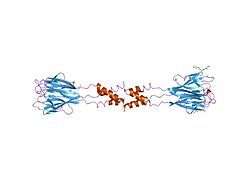From Wikipedia, the free encyclopedia
Protein-coding gene in the species Homo sapiens
Resistin-like beta is a protein that in humans is encoded by the RETNLB gene .[ 5] [ 6] [ 7]
^ a b c GRCh38: Ensembl release 89: ENSG00000163515 – Ensembl , May 2017^ a b c GRCm38: Ensembl release 89: ENSMUSG00000022650 – Ensembl , May 2017^ "Human PubMed Reference:" . National Center for Biotechnology Information, U.S. National Library of Medicine .^ "Mouse PubMed Reference:" . National Center for Biotechnology Information, U.S. National Library of Medicine .^ Holcomb IN, Kabakoff RC, Chan B, Baker TW, Gurney A, Henzel W, Nelson C, Lowman HB, Wright BD, Skelton NJ, Frantz GD, Tumas DB, Peale FV Jr, Shelton DL, Hebert CC (Sep 2000). "FIZZ1, a novel cysteine-rich secreted protein associated with pulmonary inflammation, defines a new gene family" . EMBO J . 19 (15): 4046– 55. doi :10.1093/emboj/19.15.4046 . PMC 306596 PMID 10921885 . ^ Stutz AM, Pickart LA, Trifilieff A, Baumruker T, Prieschl-Strassmayr E, Woisetschlager M (Feb 2003). "The Th2 cell cytokines IL-4 and IL-13 regulate found in inflammatory zone 1/resistin-like molecule alpha gene expression by a STAT6 and CCAAT/enhancer-binding protein-dependent mechanism" . J Immunol . 170 (4): 1789– 96. doi :10.4049/jimmunol.170.4.1789 PMID 12574343 . ^ "Entrez Gene: RETNLB resistin like beta" .
Kubota T, Kawano S, Chih DY, et al. (2001). "Representational difference analysis using myeloid cells from C/EBP epsilon deletional mice". Blood . 96 (12): 3953– 7. doi :10.1182/blood.V96.12.3953 . PMID 11090083 . Steppan CM, Brown EJ, Wright CM, et al. (2001). "A family of tissue-specific resistin-like molecules" . Proc. Natl. Acad. Sci. U.S.A . 98 (2): 502– 6. Bibcode :2001PNAS...98..502S . doi :10.1073/pnas.98.2.502 PMC 14616 PMID 11209052 . De Young MP, Damania H, Scheurle D, et al. (2003). "Bioinformatics-based discovery of a novel factor with apparent specificity to colon cancer". In Vivo . 16 (4): 239– 48. PMID 12224133 . Strausberg RL, Feingold EA, Grouse LH, et al. (2003). "Generation and initial analysis of more than 15,000 full-length human and mouse cDNA sequences" . Proc. Natl. Acad. Sci. U.S.A . 99 (26): 16899– 903. Bibcode :2002PNAS...9916899M . doi :10.1073/pnas.242603899 PMC 139241 PMID 12477932 . Clark HF, Gurney AL, Abaya E, et al. (2003). "The Secreted Protein Discovery Initiative (SPDI), a Large-Scale Effort to Identify Novel Human Secreted and Transmembrane Proteins: A Bioinformatics Assessment" . Genome Res . 13 (10): 2265– 70. doi :10.1101/gr.1293003 . PMC 403697 PMID 12975309 . He W, Wang ML, Jiang HQ, et al. (2003). "Bacterial colonization leads to the colonic secretion of RELMbeta/FIZZ2, a novel goblet cell-specific protein" . Gastroenterology . 125 (5): 1388– 97. doi :10.1016/j.gastro.2003.07.009 PMID 14598255 . Chumakov AM, Kubota T, Walter S, Koeffler HP (2004). "Identification of murine and human XCP1 genes as C/EBP-epsilon-dependent members of FIZZ/Resistin gene family" . Oncogene . 23 (19): 3414– 25. doi :10.1038/sj.onc.1207126 PMID 15064728 . Gerhard DS, Wagner L, Feingold EA, et al. (2004). "The Status, Quality, and Expansion of the NIH Full-Length cDNA Project: The Mammalian Gene Collection (MGC)" . Genome Res . 14 (10B): 2121– 7. doi :10.1101/gr.2596504 . PMC 528928 PMID 15489334 . Renigunta A, Hild C, Rose F, et al. (2006). "Human RELMbeta is a mitogenic factor in lung cells and induced in hypoxia". FEBS Lett . 580 (3): 900– 3. doi :10.1016/j.febslet.2006.01.012 . PMID 16427636 . S2CID 42905763 .





